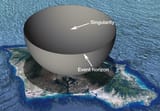>>16729540 (OP)>is general relativity truly the best model for gravity if it permits singularities to exist?Yes. Pretty much any theory in physics has singularities, including newtonian gravity.
> in any other framework, singularities indicate your model is wrong, doesn't it?Kind of, it means the model is wrong for that regime, but not everywhere else. An example from a solved problem is many singularities in fluid dynamics. The solution comes from seeing what the fluid is doing in smaller scales, where we know it's made up of individual particles and we can instead treat it like that instead of some continuous thing, which solves the problem.
The same goes for black holes, as gravity is the predominant force in a smaller and smaller volume, we need to be able to say more and more what gravity does in smaller and smaller scales to solve the problem.
>the notion that there's a singularity in black holes implies indeterminate structure, yet we can't extend past that. is that due to lack of data or reasoning?Unlike with the fluid example, we lack the ability to do experiments, so all the solutions are theoretical and people are still trying to come up with something that can be measured.
> if so, what happens when discussing density or entropy in that region?Depends on the proposed solution. Otherwise the only thing we know for certain is what happens up to the event horizon.
>when a black hole forms, how long does it take to form?Less than a second for the core of a star to collapse, which means the black hole is already formed, but the rest of the star is still there around the core. If you mean when the black hole is just there, it's when the supernova ends as the rest of the star gets ejected in the explosion following collapse.
>if a bunch of mass collapses within the Schwarzschild radius, does the singularity and horizon just instantly form or is it at the speed of light?Happens at the speed of freefall for that volume and is bound by the speed of light.


